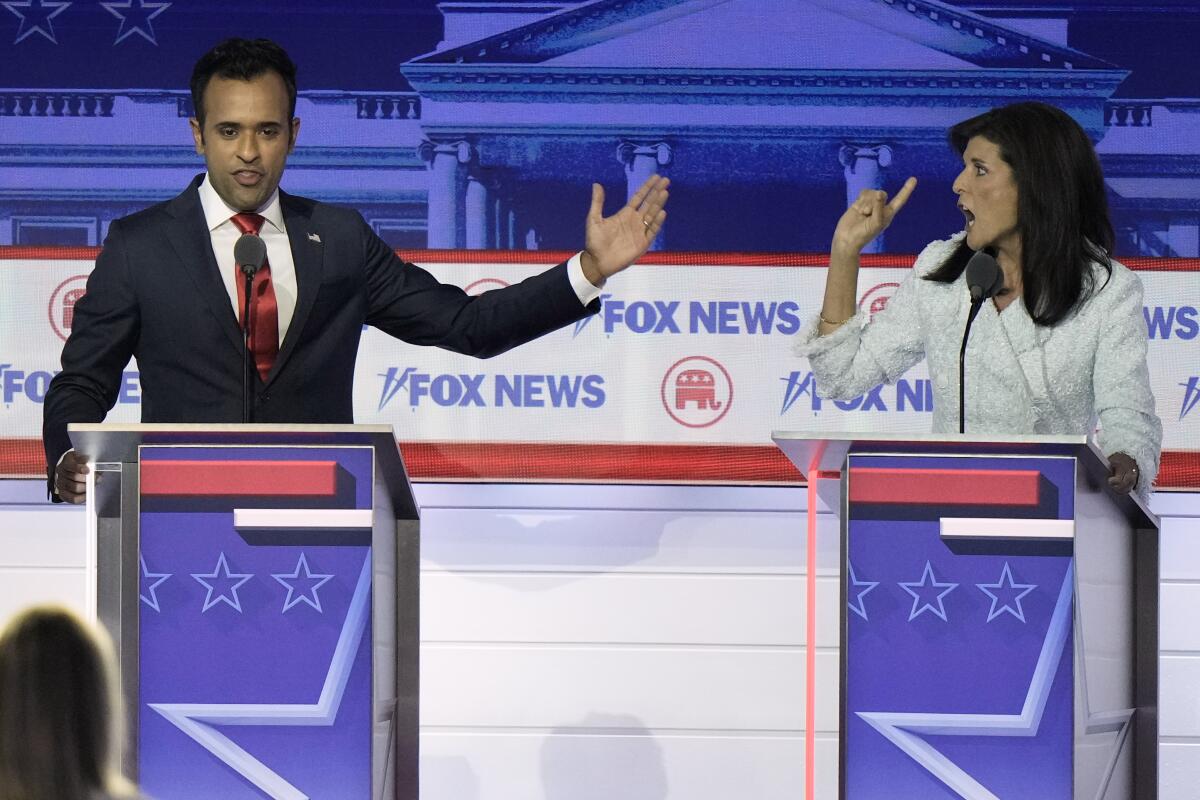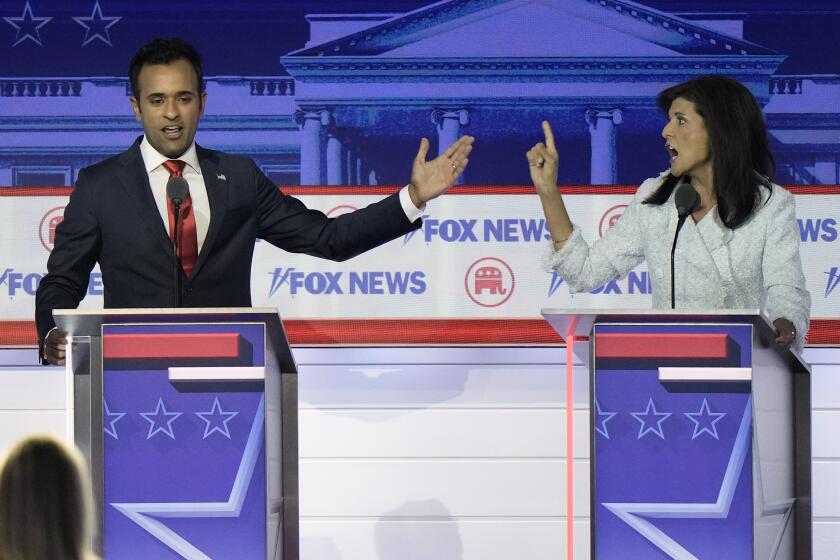Column: Republicans are divided over foreign policy. That’s good for the country — and for the GOP

- Share via
WASHINGTON — Last week, eight Republican presidential candidates did something unusual: They held a serious debate about foreign policy, focused mostly on their disagreements over U.S. aid to Ukraine.
Of those on the stage in Milwaukee, only two — Florida Gov. Ron DeSantis and upstart capitalist Vivek Ramaswamy — said they oppose additional help for Ukraine as it fights to repel the Russian invasion.
“Ukraine is not a priority for the United States,” Ramaswamy said.
DeSantis hedged his answer, saying he would halt aid unless Europe sent more. Former President Trump, who skipped the debate, has sounded similar notes.
Ron DeSantis, Trump’s former chief rival, did nothing to stop his slide; nearly all the candidates said they would back Trump despite everything; and the candidates made clear their support for abortion bans that most Americans reject.
Three candidates pushed back loudly against the Trumpist tide. Former South Carolina Gov. Nikki Haley, former Vice President Mike Pence and former New Jersey Gov. Chris Christie argued that helping Ukraine win is in the interest of the United States.
“Ukraine is the first line of defense for us.... You are choosing a murderer over a pro-American country,” Haley said of Russian President Vladimir Putin as she lectured Ramaswamy. “You don’t do that to friends.”
She elaborated on the last point later in a television interview after the debate.
“You can’t be so narcissistic [as] to think America doesn’t need alliances,” she said. “We do need allies. And when you have an ally, you take care of them.”
In three short sentences, that was a clear snapshot of the GOP divide over foreign policy.
For more than half a century, from President Dwight D. Eisenhower through George W. Bush, Republicans broadly agreed that the United States should seek global leadership based on a strong military and carefully nurtured alliances.
Trump turned that doctrine on its head, arguing that alliances, trade agreements and overseas entanglements had drained America’s wealth. Instead of working with democratic allies in Europe and Japan, he sought partnerships with Putin and China’s Xi Jinping. He boasted again of his relationships with those strongmen last week in his interview with former Fox News host Tucker Carlson.
Trump’s policy of “America First,” a semi-revival of the isolationism that reigned before World War II, is still popular among the GOP’s base of conservative voters. In presidential primary polls, the three candidates who oppose aid to Ukraine — Trump, Ramaswamy and DeSantis — appear to have the support of about three-quarters of Republican voters. Haley, Pence and Christie represent a rearguard minority.
Still, their outspoken dissents suggest that the battle over Republican foreign policy isn’t over. Plenty of other GOP figures, including Senate Republican leader Mitch McConnell of Kentucky, agree with them.
Foreign policy won’t be the issue that decides who wins the GOP nomination — or the general election. Polls show that Republican voters consider inflation, immigration and social issues (including abortion and what some call the Democrats’ “woke” agenda) more important than national security.
But last week’s mini-debate over Ukraine was still significant. Our political system gives presidents vast power to act unilaterally in foreign affairs — more than on domestic policy, where Congress often gets in the way.
Another foreign policy issue in last week’s debate is also worth noting, only it produced less conflict. Several candidates jockeyed over who would be toughest in battling fentanyl, the synthetic opioid smuggled mostly from Mexico that has caused tens of thousands of deaths.
DeSantis won that competition, saying he would order U.S. troops to cross into Mexico “on day one” if necessary to stem the flow of illegal drugs across the border. He said he would authorize troops to shoot suspected smugglers “stone cold dead.” And in a later interview, he said he would order the Navy and Coast Guard to interdict ships carrying chemicals used to produce fentanyl from China to Mexico.
If he carries out any of those threats, the first weeks of a DeSantis administration would be eventful — and perhaps harrowing.
Even Haley, a relative moderate in the primary race, has said she favors using military force against Mexican drug lords — a position that’s hugely popular among Republican voters.
“Just like we dealt with ISIS, you do the same thing with the cartels,” she said in March, apparently referring to the U.S. aerial bombing campaign that destroyed Islamic State in Syria.
Fentanyl is a genuine crisis, but it demands a response that is not only tough, but thoughtful.
Using U.S. troops to attack drug cartels makes a fine campaign soundbite. But if the next American president launches military adventures that alienate allies, neighbors and rivals like China, the costs could be very high.
It would be nice if those candidates explained how their military campaigns against the drug cartels will work, including whether and how they would first try to win Mexico’s cooperation.
Answering questions like that, after all, is what campaigns — and debates — are for.
More to Read
Get the L.A. Times Politics newsletter
Deeply reported insights into legislation, politics and policy from Sacramento, Washington and beyond. In your inbox three times per week.
You may occasionally receive promotional content from the Los Angeles Times.












